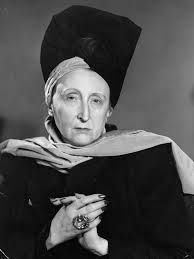 Born in 1887, poet and critic Dame Edith Sitwell was born into a family where she was left unloved by her well to do parents and spent much of her youth under the influence of her governess, Helen Rootham. Sitwell suffered from health problems from an early age and was put into an iron frame when it was diagnosed that she had a spinal deformity.
Born in 1887, poet and critic Dame Edith Sitwell was born into a family where she was left unloved by her well to do parents and spent much of her youth under the influence of her governess, Helen Rootham. Sitwell suffered from health problems from an early age and was put into an iron frame when it was diagnosed that she had a spinal deformity.
The disengagement with her parents was so great that when her mother died in 1937 Sitwell refused to go to the funeral. She published her first poem, The Drowned Suns, in the Daily Mirror and after that she worked as an editor.
Her first collection, Clown’s House was published in 1918. Throughout her life Sitwell shied away from the ordinary and championed innovation, using her flat in London as a meeting place for many up and coming young poets such as Dylan Thomas.

Sitwell spent her life unmarried though she did once have a relationship with the painter Pavel Tchelitchew though it did not last long. She lived with her governess for much of the time until Helen Rootham developed cancer and finally died in 1938. Sitwell was an awkward looking person with an angular face and tall stature that encouraged criticism as much as her poetry.
An often controversial figure, she even managed to attract the satirical wrath of Noel Coward who wrote a comedic turn about Sitwell and her brothers entitled The Swiss Family Whittlebot. She was often accused of writing about difficult subjects such as death and the war from a ‘safe’ distance though she also acted as editor and champion for poets such as Wilfred Owen.
Through the twenties and thirties, Sitwell continued to write her own poetry publishing works such as Façade and Gold Coast Customs. The latter used jazz rhythms and was considered accomplished and innovative for the time and reflected her attachment to the symbolism that had grown out of France.
Sitwell spent much time in Paris during the thirties only returning to England at the outbreak of the Second World War. She moved to her home in Renishaw writing by lamplight and knitting clothes for soldiers who were fighting across the Channel. She produced a number of memorable works during this time including The Shadow of Cain and her poem about the blitz in London called Still Falls the Rain which was put to music by none other than BenJamin Britten.

After the war, both she and her brothers embarked on a tour of the United States and gave several memorable performances of their work. In 1954, Sitwell was made a dame and a year later decided to convert to the Roman Catholic religion. By this time she was beginning to suffer from ill health and took to a wheelchair because of a longstanding condition called Marfan syndrome.
Sitwell suffered from a brain hemorrhage in 1964 and died shortly after at the age of 77. Her last poetry collection The Outcasts had been published just a few years earlier and marked the end of a long and distinguished poetry career.

